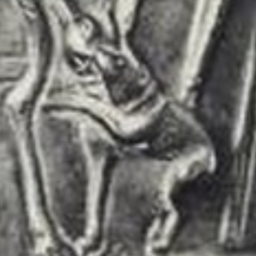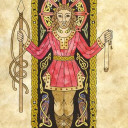Great looking site, Eikadistes!
New "TWENTIERS" Website
We are now requiring that new registrants confirm their request for an account by email. Once you complete the "Sign Up" process to set up your user name and password, please send an email to the New Accounts Administator to obtain new account approval.
Regularly Checking In On A Small Screen Device? Bookmark THIS page!
-
-
THANK YOU!
I have been reading through your letter to Herodotus a little every day. "Shining a new light" may seem trite, but it applies to your brilliant and beautiful work (I looked at that letter very closely last year, but you brought out many different and new ways of looking at it).
Just as a point of discussion: I was initially a bit surprised by your preservation of cases in the transliterations used in your translation -- certainly not something I have ever seen before -- but now I think it serves as a linguistic bridge to draw a potential student closer to the original!
-
THANK YOU!
I have been reading through your letter to Herodotus a little every day. "Shining a new light" may seem trite, but it applies to your brilliant and beautiful work (I looked at that letter very closely last year, but you brought out many different and new ways of looking at it).
Just as a point of discussion: I was initially a bit surprised by your preservation of cases in the transliterations used in your translation -- certainly not something I have ever seen before -- but now I think it serves as a linguistic bridge to draw a potential student closer to the original!
I really appreciate that. I am really glad to hear that you, in particular Bryan have found it to be a faithful reflection, and are appreciating the choices in delivery and presentation. Anything I've really drawn attention to are points that I myself once had doubts, or about which I had some kind of partial curiosity, so I do hope my approach reinforces helpful paths for study (and keeps it fun!)
-
Our friend Marcus with the Society of Friends of Epicurus shared a collection of excerpts that I have compiled into Philodemus' text "On Gods" or "On the Gods" found here.
-
Thank you for the illuminating footnote: "While “Mýs” is typically translated as “Mouse” (assumed to be a diminutive) it could equally refer to his region of origin, perhaps Mysia. Most slaves in ancient Greece were foreigners who had been captured, sold, or imprisoned."
It seems Mysia was in the area of Lampsacus and Cyzicus (we know Epikouros sent letters to friends in Cyzicus, at least, P.Herc. 1418, col. 7).
According to Strabo (Geography, 13.1.19), Epikouros associated with "the most distinguished of those in this city [Lampsacus]" so maybe he did pick up Mýs around that time and location.
-
Thank you for the illuminating footnote: "While “Mýs” is typically translated as “Mouse” (assumed to be a diminutive) it could equally refer to his region of origin, perhaps Mysia. Most slaves in ancient Greece were foreigners who had been captured, sold, or imprisoned."
It seems Mysia was in the area of Lampsacus and Cyzicus (we know Epikouros sent letters to friends in Cyzicus, at least, P.Herc. 1418, col. 7).
According to Strabo (Geography, 13.1.19), Epikouros associated with "the most distinguished of those in this city [Lampsacus]" so maybe he did pick up Mýs around that time and location.
You're welcome!
I hope it's accurate.

I made that connection while making my map of Anatolian regions, combined with some simultaneous research on the conditions of ancient Greek slavery. Once I realized Lampsakos was in Mysia, it jumped out at me (like you recognized), and it just fits really well!
-
And greetings, all!
I've added a few other fun sections:
Thanks to Marcus with SoFE, I organized The Life of Philōnídēs, by Philódēmos, here.
I mention in another post I'm trying to reconstruct key dates for Philódēmos here.
You may also find my annotations at the bottom of the latter page useful for P.Herc. investigation. Beside Philódēmos (who has, like, 190+ fragments in the library, which I haven't collected in this format because goddamn will that take me a while...), here are the rest:
- The works of Dēmḗtrios of Lakonía preserved in Herculaneum include:
— P.Herc. 124 (uncertain letter)
— P.Herc. 128 (uncertain letter)
— P.Herc. 188 (On Poems)
— P.Herc. 230 (On Poems)
— P.Herc. 831 (On Stormy Thinking)
— P.Herc. 1001 (uncertain letter)
— P.Herc. 1006 (Dinner Questions)
— P.Herc. 1012 (uncertain criticism)
— P.Herc. 1013 (On the Size of the Sun)
— P.Herc. 1014 (On Poems 2)
— P.Herc. 1055 (On the Form of a God)
— P.Herc. 1061 (On Geometry)
— P.Herc. 1083 (On the Puzzles of Polýainos)
— P.Herc. 1113b (uncertain letter)
— P.Herc. 1258 + 1822 (On the Puzzles of Polýainos)
— P.Herc. 1429 (On the Puzzles of Polyainos)
— P.Herc. 1642 (On the Puzzles of Polýainos)
— P.Herc. 1647 (On the Puzzles of Polýainos)
— P.Herc. 1786 (uncertain letter) ↩︎ - The works of Zḗnōn of Sidṓn preserved in Herculaneum include:
— P.Herc. 1533 (On the Geometric Proofs) ↩︎ - The works of Polýstratos preserved in Herculaneum include:
— P.Herc 336 (On Irrational Contempt)
— P.Herc 1520 (On Philosophy) ↩︎ - The works of Karneískos preserved in Herculaneum include:
— P.Herc. 1027 (Philísta) ↩︎ - The works of Kolṓtēs preserved in Herculaneum include:
— P.Herc. 208 (On a Refutation of Plato)
— P.Herc. 1032 (Against the Euthýdēmos of Plato) ↩︎ - The works of Polýainos preserved in Herculaneum include:
— P.Herc. 573 (Against Aristotle) ↩︎ - The works of Metródōros preserved in Herculaneum include:
— P.Herc. 200 (On Divinity)
— P.Herc. 255 (Against Dialecticians) ↩︎ - The works of Epíkouros preserved in Herculaneum include:
— P.Herc. 154 (On Nature 11)
— P.Herc. 335 (On Nature 3)
— P.Herc. 362 (On Nature 21)
— P.Herc. 419 (On Nature 25)
— P.Herc. 556 (Epistle to Ekhélaos)
— P.Herc. 506 (On Nature 9)
— P.Herc. 908 (On Nature)
— P.Herc. 989 (On Nature)
— P.Herc. 990 (On Nature)
— P.Herc. 993 (On Nature 2)
— P.Herc. 996 (uncertain letter)
— P.Herc. 1010 (On Nature 2)
— P.Herc. 1039 (On Nature)
— P.Herc. 1042 (On Nature 11)
— P.Herc. 1056 (On Nature 25)
— P.Herc. 1113a (On Nature)
— P.Herc. 1148 (On Nature 14)
— P.Herc. 1151 (On Nature 15)
— P.Herc. 1191 (On Nature 25)
— P.Herc. 1199 (On Nature)
— P.Herc. 1385 (On Nature)
— P.Herc. 1398 (On Nature)
— P.Herc. 1408 (On Nature)
— P.Herc. 1413 + 1416 (On Nature – On Time)
— P.Herc. 1420 (On Nature 25)
— P.Herc. 1431 (On Nature 34)
— P.Herc. 1479 (On Nature 28)
— P.Herc. 1639 (On Nature) ↩︎
- The works of Dēmḗtrios of Lakonía preserved in Herculaneum include:
-
Also, Bryan or Don, if you have guys have any interest, would you take a swing at translating P.Herc. 1520 ("On Philosophy") by Polystratos? My translation right now sucks.

There's a lot of P.Herc. that needs English translations.
I've connected with some folks in a Herculaneum Forum on Discord. So far, I haven't found any Epicureans, but I really would like to organize a project to provide these resources.
-
-
Unread Threads
-
- Title
- Replies
- Last Reply
-
-

-
A Question About Hobbes From Facebook
- Cassius
August 24, 2025 at 9:11 AM - Uncategorized Discussion (General)
- Cassius
August 24, 2025 at 9:11 AM
-
- Replies
- 0
- Views
- 547
-
-
-

-
Anti-Natalism: The Opposite of Epicureanism 8
- Don
August 20, 2025 at 7:41 AM - Comparing Epicurus With Other Philosophers - General Discussion
- Don
August 23, 2025 at 11:26 AM
-
- Replies
- 8
- Views
- 1.2k
8
-
-
-

-
Ecclesiastes what insights can we gleam from it? 4
- Eoghan Gardiner
December 2, 2023 at 6:11 AM - Epicurus vs Abraham (Judaism, Christianity, Islam)
- Eoghan Gardiner
August 18, 2025 at 7:54 AM
-
- Replies
- 4
- Views
- 2.4k
4
-
-
-

-
Grumphism? LOL
- Don
August 16, 2025 at 3:17 PM - Uncategorized Discussion (General)
- Don
August 16, 2025 at 3:17 PM
-
- Replies
- 0
- Views
- 559
-
-
-

-
Beyond Stoicism (2025) 20
- Don
August 12, 2025 at 5:54 AM - Epicurus vs. the Stoics (Zeno, Chrysippus, Cleanthes, Epictetus, Seneca, Marcus Aurelius)
- Don
August 15, 2025 at 4:28 PM
-
- Replies
- 20
- Views
- 2k
20
-
Finding Things At EpicureanFriends.com
What's the best strategy for finding things on EpicureanFriends.com? Here's a suggested search strategy:
- First, familiarize yourself with the list of forums. The best way to find threads related to a particular topic is to look in the relevant forum. Over the years most people have tried to start threads according to forum topic, and we regularly move threads from our "general discussion" area over to forums with more descriptive titles.
- Use the "Search" facility at the top right of every page. Note that the search box asks you what section of the forum you'd like to search. If you don't know, select "Everywhere." Also check the "Search Assistance" page.
- Use the "Tag" facility, starting with the "Key Tags By Topic" in the right hand navigation pane, or using the "Search By Tag" page, or the "Tag Overview" page which contains a list of all tags alphabetically. We curate the available tags to keep them to a manageable number that is descriptive of frequently-searched topics.

